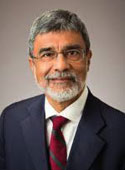World of Energy Economics

| Date: | November 23 & 24, 2023 |
|---|---|
| Time: | 9:00am - 5:00pm |
| Venue: | NIBAF, Islamabad |
| Investment: | PKR 75,000/ + 5% SST + Residential Fees: 30,000 / participant. (Inclusive of Course material, IBA Workshop Certificate, Lunch, Refreshments & Business networking) |
| Contact: | ceeinfo@iba.edu.pk (0213) 8104700 (Ext:1809, 1812, 1808, 1804) |
This is a two-day highly interactive workshop which covers key aspects of the economics of energy as it affects the world in general and Pakistan in particular. The role of energy in economic development and activity at a national (Pakistan), and global level is examined.The workshop also focuses on the tools and economic methods of assessing energy technologies and energy projects --- renewable and non-renewable.The instructor applies a critical-thinking approach to facilitate an understanding and appreciation of the ever-changing drivers shaping the world of energy.
The workshop reviews several business and financial models in the assessment of energy investments both at national and corporate levels. It facilitates an understanding of the key and diverse drivers, mechanics and dynamics of energy supply and demand. Examples are drawn from a wide range of settings.
The workshop also examines crucial areas and future developments in the field of energy economics including energy policies, rapidly evolving energy markets (oil, gas, electricity, and renewables), project evaluation, meg atrends (for example electric vehicles, micro grids, distributed energy resources) and several other topics. It critically reviews energy‘s externalities (for example climate change) and how we deal with them.
A case study, task-based and problem-solving approach is followed interspersed with instructor's lectures and expert opinions. Covers both qualitative and quantitative aspects.
- Able to comprehend and analyze the components of compensation and benefits
- Become conversant on the changing trends in C&B practices at leading organizations
- Able to strategize C&B package by linking with business objectives
- Build a basic understanding around the technical aspects of C&B function such as job evaluation methodologies, S&B surveys, salary administration program and other financial aspects
- Learn the art of linking C&B elements with organization goals
- Recognize the growing importance C&B initiatives to attract, retain and motivate talent
- Able to provide C&B solutions that creates a win-win equation for the company and the employees
- Capable to design and introduce innovative benefit plans
- Able to leverage the non-monetary benefits to add value to the overall C&B package
- Communicate with impact the Total Reward Program to the employees
- Learn through experience sharing!
1) Energy --- an introduction. Essential linkages between energy, society and technology.. Review
of data platforms. 2 hours.
2) Energy Policies --- basics, and how they affect development. Policy drivers and design considerations. 2 hours.
3) Electricity markets and structure --- global and national. Models and tools and applicability to Pakistan. Challenges ahead for Pakistan and possible remedies. 2.5 hours
4) Renewables --- where is the world heading? Opportunities and challenges --- global and national 2 hours
5) Natural Gas --- Pakistan's gas structure; challenges and solutions. 1.5 hours
6) Electric Vehicles --- micro and macro-analysis. Basic modeling. Pakistan's EV policy. 1 hour
Trainer Profile:

Muqtadar Quraishi has taught energy economics, energy policy and the energy value chain as a faculty member at Cornell University, USA for the last 5 years, from where he brings the latest in the field of energy to our work shop. Prior to this appointment he worked in the energy and chemical industry for over 30 years in senior posi tions with Caltex, Chevron and Exxon,both in Pakistan and abroad. Areas of expertise include strategic and busi ness planning, supply chain management and optimization, acquisitions, project design, evaluation, develop ment and management.
Mr. Quraishi has been a board director with Chevron Pakistan. He was also a director on the board of Pakistan Refinery Ltd. He also served on the board technical and audit committee ofa large joint venture pipeline project. He retired from Chevron in 2014 after 24 years of service, as head ofValue Chain Optimization functionally cover ing Pakistan, Egypt and the Middle East. He was also one of the authors of Pakistan's Integrated Energy Plan sponsored by the Government of Pakistan.
He has also taught Supply Chain Management at the Institute of Business Administration, Karachi, over a five-year period as an adjunct faculty. Mr. Quraishi holds a B.S. degree in mechanical engineering from Brown University, USA and a Masters in Engineering from Cornell University. He is also an MBA from IBA, Karachi.
Though this will be an open enrolment course, the target audience of this workshop is policy makers in the energy industry, economists, security and investment analysts and middle to senior managers of both energy/renewa bles organizations and those in the corporate sector. CEOs of smaller middle level entities may be also approached.
IBA CEE Cancellation Policy for Open Enrollment Programs:
In the event of participant's cancellation, the following schedule will apply:
- 5 days before start of workshop - No cancellation
- Within 4 to 2 days prior to workshop Half program fee forfeiture
- Within 1 day and No Shows - Full program fee forfeiture
Cancellation notification must be made in writing to CEE.
Postponement
Due to any unavoidable circumstances, the workshop may be postponed by the institute. In case of postponement, the institute will refund full fee of the program or the participant may opt to defer his/her registration to the next program.
Substitute
Substitutes will be taken at least 2 days prior to the workshop. Should we be unable to accept your application for any reason, your payment (cheque/draft) will be returned to you.
Deferrals
All registrations deferrals must be requested in writing at least 2 days prior to the workshop. Send a note to the Program Registration Team indicating that you wish to have your registration deferred to another session of the same program within one year. The deposited fee will be carried forward. Please note that only one transfer is permitted. After one year, the deposited fee will be fully forfeited.